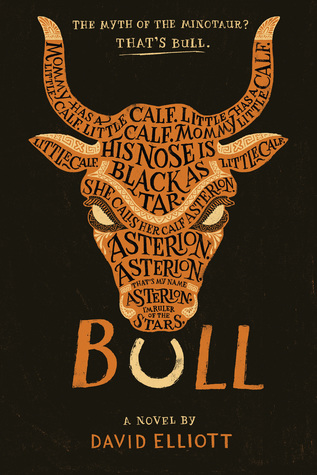I admit that myths don’t generally hold my attention. I skim them and never quite get to the end. But this? Oh,  yes.
yes.
In verse, David Elliott brilliantly casts the story of Theseus and the Minotaur in “Bull” (Houghton Mifflin Harcourt 2017). The bawdy and profane Poseidon, King of the Sea, is the involved narrator. He begins: “Whaddup, bitches?/ Am I right or am I right?/ That bum Minos deserved what he got./ I mean, I may be a god, but I’m not/ Unreasonable, and when I am, so/ What?”
When King Minos of Crete doesn’t fulfill his promise to the gods, Poseidon punishes him by making his wife, Queen Pasiphae of Crete, “have a thing/ For the white bull’s thang.” Yes she does. As a result of Pasiphae’s thing for the bull’s thang, she gives birth to Asterion who has the “head of a bull, body of a man, a.k.a. Ruler of the Stars, a.k.a. the Minotaur.”
We watch Asterion grow up—sweet, kind, smart—and troubled. His mother loves him: “In his eyes/ I see the/ sun I see/ the moon I/ see the stars/ and all the/ tilted/ whirling/ galaxies/ I see the/ undiscovered/ constellations/ I see the/ Earth I see/ nations I/ see soil and/ root and branch/ and leaf I/ see fruit I/ see seeds of . . .” The lines of Pasiphae’s poems become shorter as the story progresses, giving us the author-intended feeling that she’s coming unhinged—“off her nut,” as Poseidon tells us.
Poseidon reports on Asterion: “He’s the oldest of eight. That royal uterus is clearly first rate.” The other children—all wholly human—include daughter Ariadne and the super-athlete, Androgeos—Minos’s favorite. As for all stories that are passed along orally, there are differing versions, but in all, Androgeos dies young. In this version, it’s after competing and winning the shot put and javelin in Athens. Poseidon admits to having a hand in the death.
Now King Minos hates Asterion—the monster, the minotaur—even worse. Minos has Daedalus, the royal engineer, build a dark airless labyrinth, where Asterion, now seventeen, goes mad. But Ariadne plans to save her sweet brother and together they will escape the island of Crete.
See what I mean? It’s all so confusing. And who cares? (Sorry to you classicists).
But in this version I care. The tragedy feels so . . . tragic. And Poseidon keeps us laughing. About King Minos, Poseidon says: “Man!/ that guy’s a dick!/ But also so much fun/ To hate./ Like all dicks, though,/ He’ll soon deflate,/ And there’s no little blue pill,/ No herbal tea/ That will restore his “potency.”/ Well, one man’s dysfunction/ Is a god’s delight.”
Poseidon is not done making mischief, ensuring the tragic ending. If you know your mythology, I’m giving nothing away. If you don’t know your mythology, this is the place to find out. It’s all in the telling.
Patricia Hruby Powell is author of the young adult documentary novel Loving vs. Virginia and Josephine: The Dazzling Life of Josephine Baker talesforallages.com

Leave a Reply